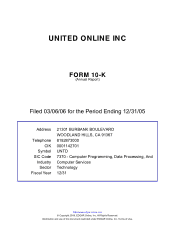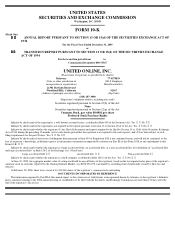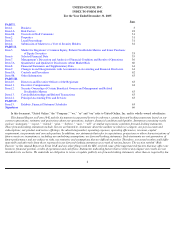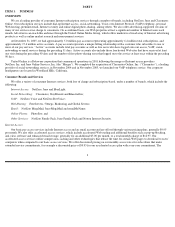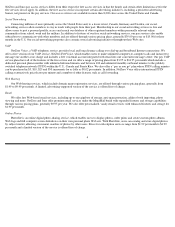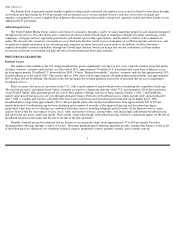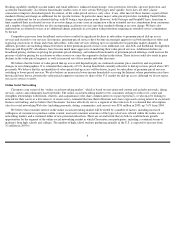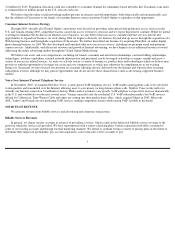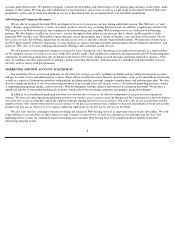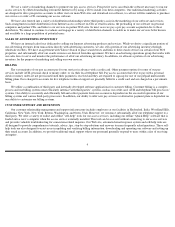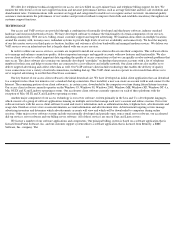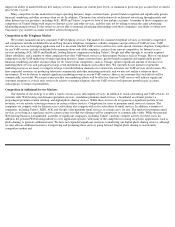Classmates.com 2005 Annual Report Download - page 7
Download and view the complete annual report
Please find page 7 of the 2005 Classmates.com annual report below. You can navigate through the pages in the report by either clicking on the pages listed below, or by using the keyword search tool below to find specific information within the annual report.
blocking capability, multiple account names and email addresses, enhanced email storage, virus protection, firewalls, spyware protection, and
accelerator functionality. Accelerator functionality enables users to view certain Web pages more quickly, but it does not offer a faster
connection or improve download speeds. In contrast, of the value-priced services, only a few, if any, offer most of these features as part of their
standard offering and charge an additional fee for specific features. In particular, many major value-priced providers, including United Online,
charge an additional fee for accelerated dial-up, with $5 being a typical price point. However, both Netscape and PeoplePC have, from time to
time, marketed their accelerated services at no extra charge, in some cases in conjunction with an extended service commitment from consumers,
and a number of smaller providers are also incorporating accelerator services into their standard offering at no extra charge. We have also
marketed our accelerated services at no additional charge, primarily in association with promotions requiring an extended service commitment
by the user.
Competitive pressures from broadband services have resulted in significant declines in subscribers to premium-priced dial-up access
services and recently to our services. In response, premium-priced services have become increasingly aggressive in both introductory offers and
in pricing concessions to obtain and retain subscribers, with some services offering up to six months free in particular market channels. In
addition, providers are including enhanced features in their premium-
priced services at no additional cost, and AOL and EarthLink, through their
Netscape and People PC subsidiaries, have become much more aggressive in marketing their value
-priced services. Additional declines in
broadband pricing, declines in pricing for premium-priced offerings, and enhanced functionality of premium-priced offerings could increase the
pressure of add-on pricing for accelerator or other services or cause the segment to decline in the future. These factors could also result in price
declines in the value-priced segment, as well as increased use of free months and other discounts.
We believe that the future of value-priced dial-up access will depend largely on continued consumer price sensitivity and on potential
changes in user demographics. It is estimated that a majority of U.S. dial-up households currently subscribe to dial-up services priced above $15
per month. We believe that the sustainability of value-priced dial-up access will be driven, in part, by subscribers of premium-priced services
switching to lower-priced services. We also believe an increase in lower-income households accessing the Internet, where penetration rates have
historically been lowest, position the value-priced segment to increase its share of the U.S. market for dial-up access, although we do not expect
our access services to grow.
Online Social Networking
Classmates.com is part of the “online social-networking market,” which is based on user-generated content and includes personals, dating
services, careers and community-based networks. The online social networking market serves consumers seeking to rediscover, create and
strengthen relationships with friends, relatives, and acquaintances who share common interests or past experiences, or who may be looking to
network for their career or a love interest. A recent survey estimated that one-
third of Internet users have expressed a strong interest in social and
business networking, and we believe that Classmates’ business effectively serves a segment of these interests. It is estimated that subscription
sales for social networking Web sites (including personals, dating, communities, and careers) was $556 million in 2005, up 7.6% from 2004.
We believe that consumer interest in the online social-networking market will be fueled by a number of factors, including increased
willingness of consumers to purchase online content, increased consumer awareness of the types of services offered within the online social-
networking market, and a continued influx of new potential subscribers. There are several trends that we believe could indicate growth
opportunities for the segment of the online social-networking market in which Classmates.com participates, including a continual stream of
graduates from high schools and colleges. The number of high school students graduating annually in the U.S. is expected to increase from
3.1 million in 2005 to
6

